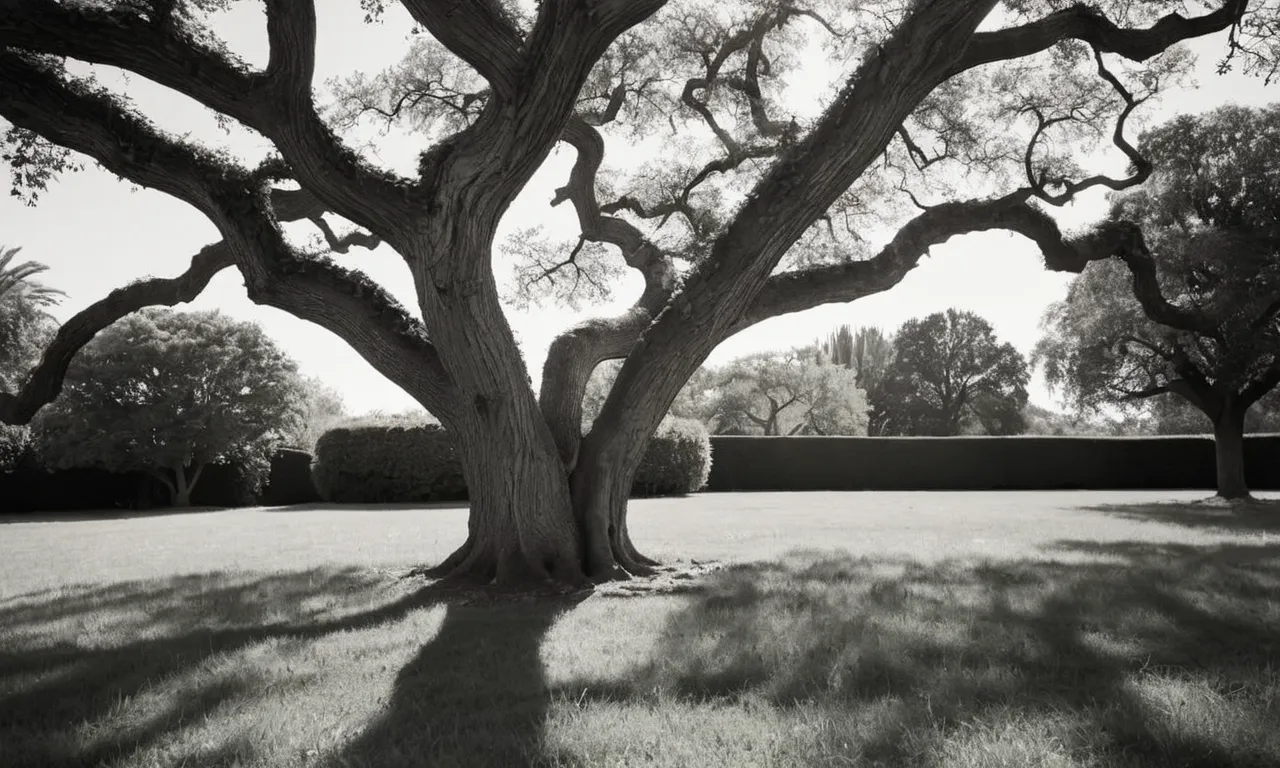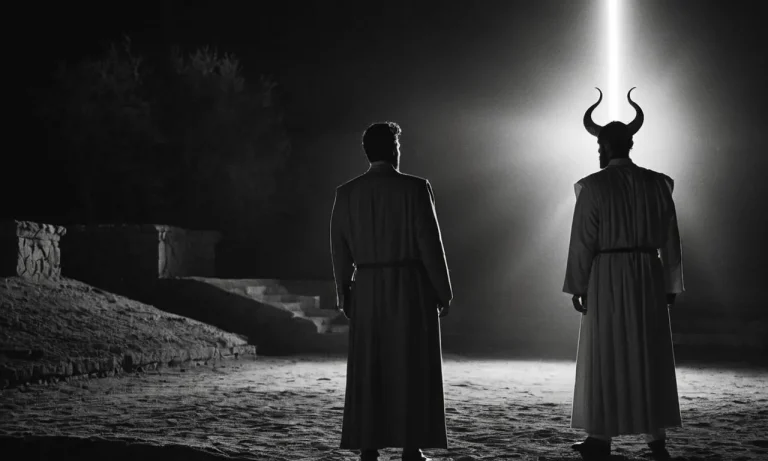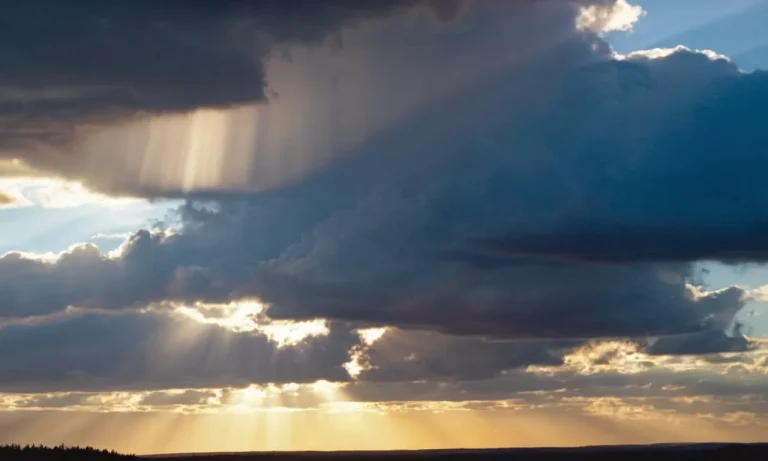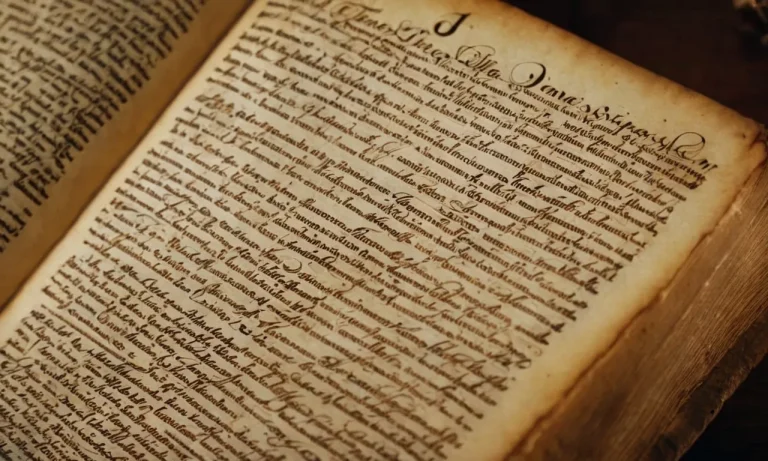Why Did God Put The Tree Of Knowledge In The Garden Of Eden?
Since the beginning of time, humanity has wrestled with understanding why an all-knowing and loving God would put the forbidden Tree of Knowledge in the Garden of Eden. If He did not want Adam and Eve to eat from it, why tempt them so?
This question has perplexed philosophers, theologians, and believers alike for centuries.
If you’re short on time, here’s a quick answer: God put the Tree of Knowledge in the Garden to give Adam and Eve free will – the ability to choose between obedience and disobedience. Without choice, neither virtue nor love is possible.
In this comprehensive article, we will examine the various theological perspectives on why God tested Adam and Eve with the forbidden tree. We will analyze key biblical passages, review expert interpretations from Christian thought leaders, and synthesize these findings into a holistic explanation.
The Tree As a Test of Obedience
God Commanded Adam and Eve Not to Eat the Fruit
In the Garden of Eden, God gave Adam and Eve complete freedom, with only one restriction – they were not to eat from the Tree of Knowledge of Good and Evil (Genesis 2:16-17). This command served an important purpose – to test whether humanity would trust and obey their Creator.
God did not withhold the tree out of spite or a desire to deny Adam and Eve, but rather to allow them to demonstrate their love and devotion through obedience.
The Purpose of Commands is to Test Obedience
As a loving parent sets rules to protect and guide their child, God established commands to allow His creation to grow in wisdom and faithfulness. Obedience demonstrates trust – if we believe God has our best interests in mind, we will listen and follow His word.
Just as muscles grow through resistance training, so too does our spiritual strength increase as we choose God’s way over our own. God never expected perfection, but desired authentic relationship fostered through humanity’s willing obedience.
Obedience Allows for an Authentic Relationship
God wished for Adam and Eve to choose loyalty to their Creator out of sincere love, not mere obligation. According to theologian John Piper, God created the Tree and its restriction to “make a place for genuine obedience to come from a genuinely willing heart.”
Precisely because they had choice, Adam and Eve’s obedience would confirm an authentic bond – made stronger through tests of faith. Sadly, they failed this test, but God’s purpose remains clear: Obedience enables true relationship.
Necessity of Free Will
The Tree Enabled Choice
The tree of knowledge of good and evil, placed in the Garden of Eden by God, enabled humanity to have a choice to obey or disobey God’s command not to eat from it. Without that choice, humanity would have been little more than pre-programmed robots, unable to form a genuine loving relationship with God.
True love and obedience requires the possibility to choose otherwise. The tree made this choice possible.
Without Choice, Virtue and Love Are Meaningless
If Adam and Eve did not have the option or ability to disobey God, then their obedience would have been meaningless. Virtues like integrity and loyalty cannot exist without the possibility of falling into vice and betrayal. The tree opened up this possibility.
In fact, most of what’s valuable in human experience requires choice and the risk that comes with it: love, trust, mercy, forgiveness, sacrifice. All of these lose their virtue in the absence of real choice.
As the philosopher Martin Buber put it, divine-human encounters happen in the realm of freedom: “Where choice is found is the birthplace of good and evil” (Buber 1952). Freedom makes good and evil actions possible. The tree enabled this sphere of encounter with God.
Allowing Evil Was Necessary
If God’s objective was to have beings capable of genuinely knowing, loving, and choosing relationship with God, then significant risk had to be allowed. Without choice, there is no growth, no courage, and no love. As C.S.
Lewis argued, God saw allowing the existence of evil, disease, and disaster as preferable to a world populated by creatures who could not choose the good: “It would … be dethroning God if He looked on us as a mere spectacle, pulled by wires as a puppetmaster pulls his puppet’s strings” (Lewis 1952).
God valued humanity’s free will more than preventing all evil and suffering. To remove humanity’s ability to choose, God would have had to make them something less than human. This ability to choose made profound relationship possible, even knowing humanity might abuse its freedom and need redemption.
The Fall of Man
Consequences for Disobedience
When Adam and Eve disobeyed God by eating the forbidden fruit, it led to catastrophic consequences not just for them but for all of humanity. As Genesis 3 describes, their eyes were opened to the knowledge of good and evil, and they realized their nakedness and became ashamed.
They tried to hide from God, showing their damaged relationship with their Creator. God cursed the serpent who tempted them and put enmity between the serpent and Eve and between their offspring. Eve and all women after her would endure pain in childbirth.
Adam would toil painfully for food all his life, working the ground from which he was taken (Genesis 3:16-19). Most tragically, they were banished from the garden and from access to the tree of life, resulting in their eventual physical death.
Beyond just Adam and Eve individually, the consequences of their sin permeated their relationships. When God confronted Adam about eating the forbidden fruit, Adam blamed Eve. Eve blamed the serpent. Their sin broke humanity’s perfect communion with God and damaged even the most sacred human relationships (Genesis 3:8-13).
The result of Adam and Eve’s disobedience was the fall of mankind. Sin entered the world, and with sin came death. But even in judging them, God showed mercy by providing clothing and preventing them from eating from the tree of life in their fallen state (Genesis 3:21, 24).
Parallels to Spiritual Growth
The Genesis narrative provides insight about human nature and spiritual growth. Like Adam and Eve, we often desire knowledge and experiences that God has forbidden, foolishly thinking that partaking of them will make us happier or more complete.
But as they learned, disobedience damages our relationship with God. We hide from God in shame and make excuses when confronted with our sin.
However, just as God pursued Adam and Eve and provided redemption, He relentlessly pursues us. Through spiritual disciplines like prayer, Bible study, fasting, and Christian community, we can reverse the consequences of the Fall in our lives. As we obey God, our fellowship with Him is restored.
Spiritual maturity involves moving from hiding in shame to resting in God’s love, from making excuses to freely confessing our sins so we can be cleansed (1 John 1:9), from passing blame to taking responsibility.
Just as the tree brought separation from God, the cross of Christ brings reconciliation.
Redemption through Christ
While the tree created division between God and man, Christ’s death on the cross bridged that gap, providing redemption. 1 Corinthians 15:22 states, “For as in Adam all die, so also in Christ all will be made alive.” Romans 5:12-21 contrasts Adam and Christ as representative heads of mankind.
Through Adam, sin and death entered the world. But through Christ came grace, righteousness, and eternal life. If Adam’s act of eating the forbidden fruit brought death, Christ’s sacrificial act of dying on the cross enables life.
Some theologians compare the tree of life in Genesis to the cross, as both were made of wood. While the tree of knowledge brought death through disobedience, the cross brings life through obedience. Just as God walked with Adam and Eve before the Fall, Christ’s sacrifice enables us to once again have intimacy with God.
Where Adam and Eve covered themselves with fig leaves out of shame, Christ clothes us in His righteousness (Galatians 3:27). The tree prohibited man from eating of the tree of life, but Christ is Himself the bread and water of life (John 6:35).
In Christ, the curse of Genesis is reversed. Eternal life is granted not by works or obedience to law but by grace through faith in Christ’s redemptive work on the cross (Ephesians 2:8-9). Thanks to Christ’s obedience, the curse of the Fall is conquered.
Paradise is restored, and mankind can once again inhabit God’s presence.
The Mystery of God’s Will
Incomprehensibility of Divine Wisdom
God’s wisdom and knowledge are infinite and beyond human understanding. As Isaiah 55:8-9 states, “For my thoughts are not your thoughts, neither are your ways my ways, declares the Lord. For as the heavens are higher than the earth, so are my ways higher than your ways and my thoughts than your thoughts.”
We with our finite minds cannot fully comprehend the infinite wisdom and grand design of God’s plan. However, we can marvel at the mystery and beauty of God’s sovereignty as it unfolds.
Throughout history, God has permitted evil and suffering to occur according to His divine will and purpose. Although it can be painful and difficult for us to understand, God uses trials and tribulations to purify and strengthen our faith, develop our character, and draw us closer to Himself.
As Romans 8:28 promises, “And we know that for those who love God all things work together for good, for those who are called according to his purpose.”
Sovereignty and Divine Permission of Evil
As sovereign Lord over all creation, God has the supreme authority and power to allow or stop any event. However, in His infinite wisdom, God may permit certain evils or trials for reasons that we cannot fully grasp.
For example, God allowed Satan to tempt Adam and Eve, yet their fall resulted in the glorious redemptive work of Christ on the cross. God also permitted Job’s suffering to reveal Job’s faith and trust in God’s sovereignty.
Although evil is contrary to God’s holy nature, He is able to use it to accomplish His divine purposes. For instance, God may use suffering to draw people to depend on Him more fully, to refine their faith, to equip them to minister to others, or to display His grace and redemption.
Romans 5:20 states, “But where sin increased, grace abounded all the more.” While God does not directly cause evil, He is able to incorporate it into His grand plan for humanity’s salvation and His glory.
Conclusion
In examining key biblical passages and expert perspectives, we find that God allowed the Tree of Knowledge both to test Adam and Eve’s obedience, and to grant them real free will. Without the capacity to choose evil, human virtues like love and faith would be meaningless.
While God’s motivations remain partially veiled in mystery, the story of the Garden of Eden reveals fundamental truths about human nature and our relationship with our Creator. As fallen beings, we struggle to comprehend His divine wisdom.
Yet through Christ, we find redemption and a restored relationship with God.








